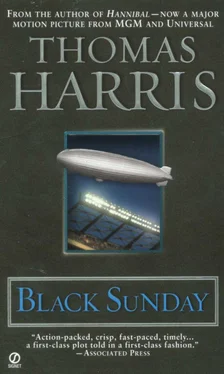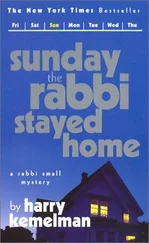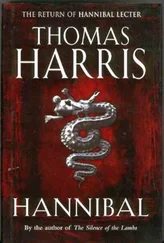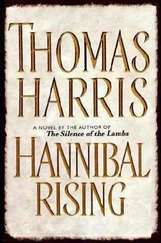A column of armored personnel carriers rumbled along the street behind them, and she had to speak loudly to be heard. “I’m thinking that in some Cairo hospital they’re working just as hard to clean up the messes you make. Even in peacetime you do it, don’t you? You and the fedayeen.”
“There is no peacetime.”
“They gossip at the hospital. You’re some sort of super commando, aren’t you?” She could not stop now and her voice was shrill. “Do you know what? I was passing through the lounge at the hotel, going to my room, and I heard your name. A little fat man, a second secretary from one of the foreign missions, was drinking with some Israeli officers. He was saying that if real peace ever comes they’ll have to gas you like a war dog.”
Nothing. Kabakov still, his profile indistinct against the dark trees.
The anger went out of her suddenly, leaving her slack, sick that she had struck at him. It was an effort for her to speak, but she owed him the rest of the story. “The officers stood up. One of them slapped the fat man’s face and they walked away with their drinks still on the table,” she finished miserably.
Kabakov stood in front of her. “Get some sleep, Dr. Bauman,” he said, and then he was gone.
Kabakov’s duties chafed him in the next month—office work. He had been transferred back to the Mossad, which was working furiously to determine the full damage wrought on Israel’s ring of enemies in the Six-Day War and to estimate their potential for a second strike. There were exhaustive debriefings of pilots, unit commanders, and individual soldiers. Kabakov conducted many of the debriefings, collating the material with information provided by sources within the Arab countries and reducing the results to terse memoranda carefully studied by his chiefs. It was tiresome, tedious work and Rachel Bauman intruded only occasionally into his thoughts. He neither saw nor called her. Instead, he confined his attentions to a ripe Sabra sergeant with a bulging blouse, who could have ridden a Brahma bull without holding on to the rope. His Sabra was soon transferred and he was alone again, remaining alone by choice, numbed by the routine of his work, until a party brought him out.
The party was his first real celebration since the war ended. It was organized by two dozen of the men who served in Kabakov’s paratroop section and was attended by a wild and friendly group of fifty—men and women, soldiers all. They were bright-eyed and sunburned and most of them were younger than Kabakov. The Six-Day War had scorched the youth off their faces, and now, indomitable as a hardy crop, it was coming back again. The women were glad to be in skirts and sandals and bright blouses instead of uniform, and it was good to look at them. There was little discussion of the war, no mention of the men they had lost. Kaddish had been said and would be said again.
The group took over a café on the outskirts of Tel Aviv beside the road to Haifa, an isolated building blue-white under the moon. Kabakov heard the party from three hundred yards away as he approached in his jeep. It sounded like a riot with musical accompaniment. Couples were dancing inside the café and under an arbor on the terrace. A ripple of attention swept over the room as Kabakov entered, weaving his way through the dancers, acknowledging a dozen greetings yelled above the crashing music. Some of the younger soldiers pointed him out to their companions with a glance and a nod of the head. Kabakov was pleasantly aware of all this, though he made an elaborate effort not to show it. He knew that it was wrong to make anything special of him. Every man took his own chances. These people were just young enough to want to indulge themselves in this bullshit, he thought. He wished Rachel were here, wished she had come in with him, and he believed innocently that the wish had nothing to do with his welcome. Damn Rachel!
He made his way to a long table at the end of the terrace, where Moshevsky was seated with some lively girls. Moshevsky had an assortment of bottles before him, and he was telling lewd knock-knock jokes as fast as he could think of them. Kabakov felt good and the wine made him feel better. The men at the party held a variety of ranks, commissioned and noncommissioned, and no one thought it strange that a major and a sergeant should carouse side by side. The discipline that had carried the Israelis across the Sinai was born of mutual respect and sustained by esprit, and it was like a coat-of-mail that could be hung by the door on these occasions. This was a good party: the people understood each other, the wine was Israeli, and the dances were the dances of the kibbutz.
Just before midnight, through the whirling dancers, Kabakov spotted Rachel hesitating at the edge of the light. She walked toward the arbor where the couples danced, clapping their hands and singing.
The air was soft on her arms and brushed her legs beneath the short denim dress, air scented with wine and strong tobacco and warm flowers. She saw Kabakov, lounging back like Nero at his long table. Someone had put a flower behind his ear and a cigar was in his teeth. A girl leaned toward him talking.
Shyly, Rachel approached his table, through the dancers and the music. A very young lieutenant grabbed her and spun her in the dance and, when the room stopped whirling, Kabakov was standing before her, his eyes wine-bright. She had forgotten how big he was. “David,” she said, looking up into his face, “I want to tell you—”
“That you need a drink,” Kabakov said, holding out a glass.
“I go home tomorrow—they said you were here and I couldn’t leave without—”
“Without dancing with me? Of course not.”
Rachel had danced during her kibbutz summer years before, and the steps came back to her now. Kabakov had a remarkable facility for dancing with a glass in his hand, obtaining refills in full flight, and they drank from it by turns. With his other hand he reached behind her and plucked the pins from her hair. It tumbled in a dark red mass down her back and around her cheeks, more hair than Kabakov would have believed possible. The wine warmed Rachel, and she found herself laughing as she danced. The other, the pain and mutilation she had been steeped in, seemed distant.
Quite suddenly it was late. The noise had dropped and many of the revelers had left without Kabakov or Rachel noticing. Only a few couples still danced beneath the arbor. The musicians were asleep, their heads down on a table by the bandstand. The dancers were very close together, moving to an old Edith Piaf song played on the jukebox near the bar. The terrace was strewn with crushed flowers and cigar ends and puddled with wine. A very young soldier, his foot in a cast propped up on a chair, was singing along with the record, holding a bottle at his side. It was late, late, the hour when the moon fades and objects harden in the half-light to take the weight of day. Kabakov and Rachel barely moved to the music. They stopped entirely, warm against each other. Kabakov kissed away a trickle of sweat on the side of her neck, tasted the sweat, a drop of the moving sea. The air that she had warmed and scented rose to touch his eyes and throat. She swayed, a short sidestep to keep her balance, thigh sliding over his, around his, holding, remembering absurdly the first time she had laid her cheek on the warm hard side of a horse’s neck.
They parted slowly in a deepening V that let the light between them, and walked outside in the still dawn, Kabakov hooking a bottle of brandy off a table as he passed. The beaded grass wet Rachel’s ankles as they climbed the hillside path, and they saw details of the rocks and brush with the unnatural clarity of vision that follows a sleepless night.
Sitting with their backs against a rock, they watched the sun come up. In the light of that clear day, Kabakov could see the tiny flaws in her complexion, the freckles, the lines of fatigue beneath her eyes, the good cheekbones. He wanted her very much and time had run out.
Читать дальше












